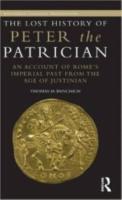
Routledge (2015) h/b 185pp £75 (ISBN 9780415516631)
Peter the Patrician is not likely to be a name familiar to many readers, but he was a figure of some importance during the reign of Justinian in the sixth century AD. His origin in Thessalonica and education in law meant that he was fluent in both Greek and Latin, which facilitated his involvement in a number of significant diplomatic missions from Constantinople, whether to the Ostrogothic regime in the west or the Persians in the east. For many years he also held the important late Roman court post of Master of the Offices, whose remit included oversight of the empire’s foreign relations alongside a range of other duties. As with so many men of public affairs in the ancient world, he also turned his hand to writing history, and it is the extant results of his labours which are the focus of this volume—another addition to Routledge’s useful Classical Translations series.
Only extracts from Peter’s history (written in Greek) have survived, primarily through their inclusion in the compilations put together in the tenth century on the initiative of Constantine Porphyrogenitus. These compilations have quite a complex textual and scholarly history, and in addition to detailing what is known of Peter’s life, the Introduction provides a clear overview of that history. The meat of the volume, however, is a translation of and brief commentary on the surviving excerpts—215 of them, by the author’s reckoning—preceded by the testimonia for Peter’s history.
In the absence of the history’s preface, its parameters have to be deduced from what is extant. The earliest fragment concerns events in 40 BC, prompting the author to suggest that the starting point was Octavian’s rise to power; the latest fragment is from the year 358, which may indicate the end of the Constantinian dynasty as the terminal point. Since Peter seems to have drawn on Dio for the earlier centuries, these excerpts are less illuminating than those relating to the less well documented third and early fourth centuries. Because of the particular interest of Constantine Porphyrogenitus’ excerptors in embassies, many of Peter’s surviving fragments provide fascinating vignettes of diplomatic activity, such as a governor of Moesia using time-honoured delaying tactics against the Carpi in the late 230s, or Galerius putting a Persian envoy in his place in the aftermath of Roman victory in 298.
This is an excellent, scholarly volume, but one whose content is likely to be of most interest to a specialist audience. This, together with the hefty price being asked for such a slim book, means that it is, unfortunately, likely to find a place only in university libraries.
Doug Lee—University of Nottingham
